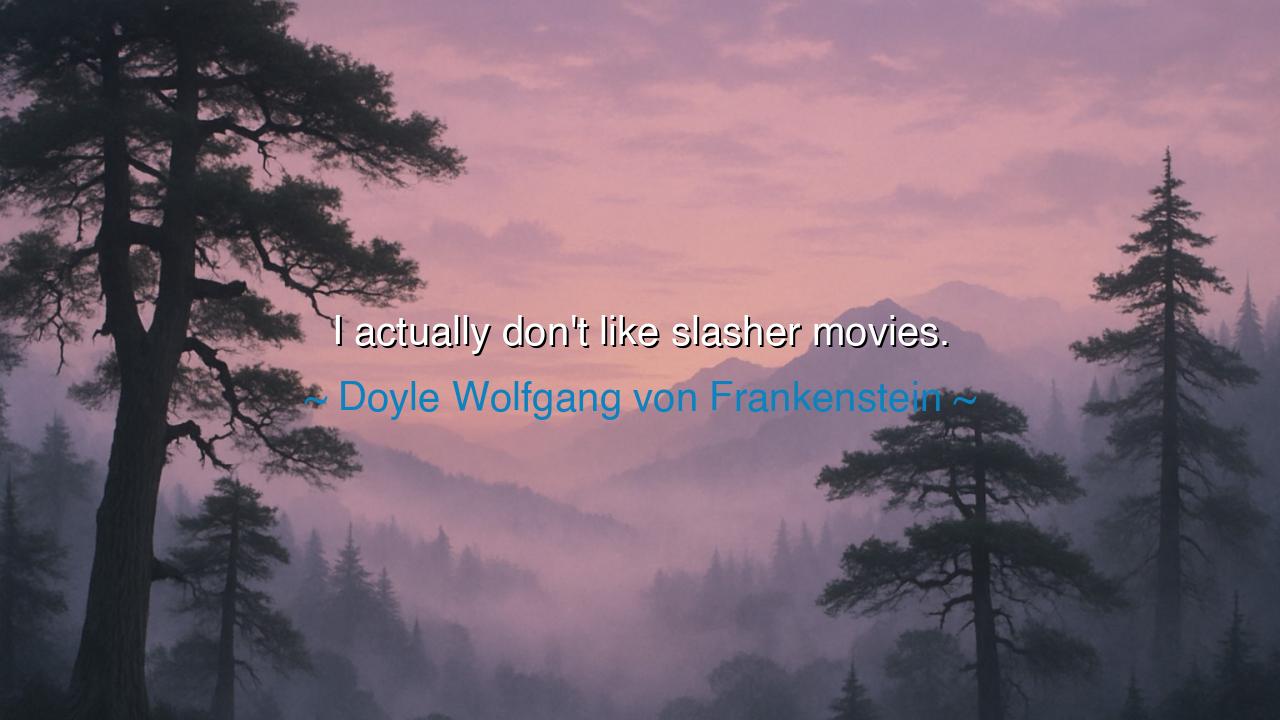
I actually don't like slasher movies.






Listen closely, O seekers of wisdom, to the words of Doyle Wolfgang von Frankenstein, who speaks plainly yet powerfully about his aversion to the genre of slasher movies: “I actually don’t like slasher movies.” In these few words lies a deeper reflection on the nature of art, violence, and the kind of stories we choose to engage with. Slasher films, with their endless cycles of bloodshed and terror, may captivate many, but to von Frankenstein, they hold no value. His dislike reveals not only a personal preference but a profound understanding of what we consume and how it shapes our souls. These films, in his eyes, offer not substance but sensationalism, and this, O seekers, is where the heart of his message lies.
In the ancient world, those who created stories—whether bards, philosophers, or poets—did so not for the mere thrill of the audience, but to impart something greater. Consider Homer, whose tales of heroes and gods were not simply a collection of events, but explorations of morality, honor, and the human condition. Achilles and Odysseus did not merely exist to bring entertainment; their stories challenged the listener to reflect on the deeper truths of life. Von Frankenstein’s words remind us that true stories, those that resonate and endure, cannot be mere spectacles of violence and shock. They must touch upon the truths of the human experience, speaking to something higher than the mere satisfaction of primal instincts.
Think also of the ancient Greek tragedies, where characters faced the consequences of their choices, often leading to suffering and redemption. These stories, though filled with pain and loss, were not mere exercises in entertainment, but moral lessons about the balance between fate and free will, about the depths of human emotion, and the costs of pride and hubris. Slasher films, by contrast, often focus on the gratification of fear and the thrill of violence, with little consideration of the moral or emotional weight of the actions portrayed. In von Frankenstein’s perspective, such films lack the depth and purpose that the ancients cherished in their stories. They are empty, offering nothing but transient excitement.
Consider the tale of Romeo and Juliet, whose tragic love and eventual deaths are not merely a reflection of fate but of the human heart’s capacity for intense emotion and the complexity of relationships. The power of this story does not lie in the violence of their deaths, but in the heartbreak that leads to their tragic end. Similarly, von Frankenstein’s distaste for slasher films lies in the belief that the true power of cinema should not come from bloodshed or fear, but from the exploration of the depths of human experience. True art, like Shakespeare’s plays, speaks to the soul, urging us to confront our deepest fears, desires, and values, not to merely entertain us with visceral thrills.
There is a lesson here for all who seek meaning in the world: the true value of a story lies not in its ability to provoke sensational reactions, but in its power to transcend the moment and touch upon the timeless truths of the human experience. Slasher movies, though they have their place in the spectrum of human expression, often reduce the depth of storytelling to mere shock value. They give us fear and violence, but do not ask us to reflect on the morality of these actions, nor do they challenge us to grow through the experience. Von Frankenstein’s rejection of these films is not an attack on their right to exist, but a call to return to stories that ask us to think deeply, to reflect on what it means to be human.
Thus, O future generations, take this lesson to heart: in the creation of your own lives and endeavors, seek not the fleeting satisfaction of the sensational, but the lasting value of stories that speak to the depths of the soul. Just as von Frankenstein calls for a more meaningful form of art, so too should you seek to craft lives that resonate with purpose, wisdom, and integrity. Avoid the trap of being seduced by the superficial pleasures that violence and shock can offer, and instead, strive to create stories and lives that reflect truths that transcend the moment.
Remember, O seekers, the stories we consume shape the people we become. In your creative endeavors, whether in art, work, or life itself, let your actions reflect not the desire for quick thrills, but for lasting significance. Von Frankenstein’s words remind us that while the world may seek short-term entertainment, the true artist and the wise soul look to the future, crafting legacies that are built on the depth of their choices and the meaning they bring to the world. Choose stories, and choose lives, that inspire growth, reflection, and true understanding.






AAdministratorAdministrator
Welcome, honored guests. Please leave a comment, we will respond soon